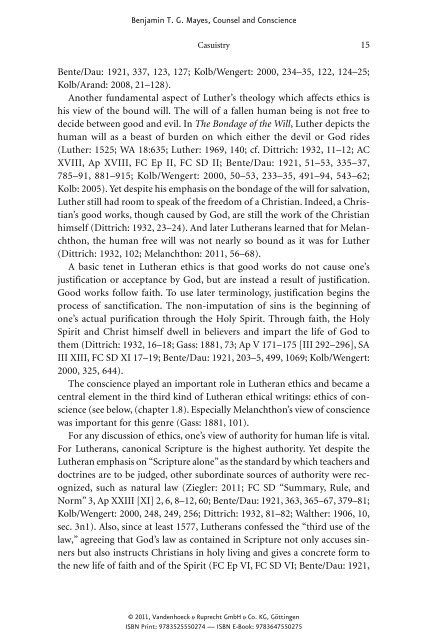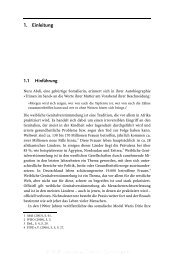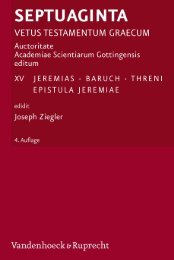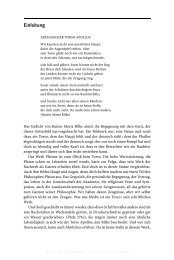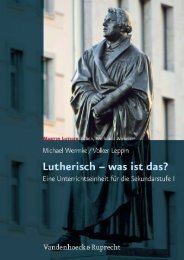Counsel and Conscience
Counsel and Conscience
Counsel and Conscience
Create successful ePaper yourself
Turn your PDF publications into a flip-book with our unique Google optimized e-Paper software.
Benjamin T. G. Mayes, <strong>Counsel</strong> <strong>and</strong> <strong>Conscience</strong><br />
Casuistry 15<br />
Bente/Dau: 1921, 337, 123, 127; Kolb/Wengert: 2000, 234–35, 122, 124–25;<br />
Kolb/Ar<strong>and</strong>: 2008, 21–128).<br />
Another fundamental aspect of Luther’s theology which affects ethics is<br />
his view of the bound will. The will of a fallen human being is not free to<br />
decide between good <strong>and</strong> evil. In The Bondage of the Will, Luther depicts the<br />
humanwillasabeastofburdenonwhicheitherthedevilorGodrides<br />
(Luther: 1525; WA 18:635; Luther: 1969, 140; cf. Dittrich: 1932, 11–12; AC<br />
XVIII, Ap XVIII, FC Ep II, FC SD II; Bente/Dau: 1921, 51–53, 335–37,<br />
785–91, 881–915; Kolb/Wengert: 2000, 50–53, 233–35, 491–94, 543–62;<br />
Kolb: 2005). Yet despite his emphasis on the bondage of the will for salvation,<br />
Luther still had room to speak of the freedom of a Christian. Indeed, a Christian’s<br />
good works, though caused by God, are still the work of the Christian<br />
himself (Dittrich: 1932, 23–24). And later Lutherans learned that for Melanchthon,<br />
the human free will was not nearly so bound as it was for Luther<br />
(Dittrich: 1932, 102; Melanchthon: 2011, 56–68).<br />
A basic tenet in Lutheran ethics is that good works do not cause one’s<br />
justification or acceptance by God, but are instead a result of justification.<br />
Good works follow faith. To use later terminology, justification begins the<br />
process of sanctification. The non-imputation of sins is the beginning of<br />
one’s actual purification through the Holy Spirit. Through faith, the Holy<br />
Spirit <strong>and</strong> Christ himself dwell in believers <strong>and</strong> impart the life of God to<br />
them (Dittrich: 1932, 16–18; Gass: 1881, 73; Ap V 171–175 [III 292–296], SA<br />
III XIII, FC SD XI 17–19; Bente/Dau: 1921, 203–5, 499, 1069; Kolb/Wengert:<br />
2000, 325, 644).<br />
The conscience played an important role in Lutheran ethics <strong>and</strong> became a<br />
central element in the third kind of Lutheran ethical writings: ethics of conscience<br />
(see below, (chapter 1.8). Especially Melanchthon’s view of conscience<br />
was important for this genre (Gass: 1881, 101).<br />
For any discussion of ethics, one’s view of authority for human life is vital.<br />
For Lutherans, canonical Scripture is the highest authority. Yet despite the<br />
Lutheran emphasis on “Scripture alone” as the st<strong>and</strong>ard by which teachers <strong>and</strong><br />
doctrines are to be judged, other subordinate sources of authority were recognized,<br />
such as natural law (Ziegler: 2011; FC SD “Summary, Rule, <strong>and</strong><br />
Norm” 3, Ap XXIII [XI] 2, 6, 8–12, 60; Bente/Dau: 1921, 363, 365–67, 379–81;<br />
Kolb/Wengert: 2000, 248, 249, 256; Dittrich: 1932, 81–82; Walther: 1906, 10,<br />
sec. 3n1). Also, since at least 1577, Lutherans confessed the “third use of the<br />
law,” agreeing that God’s law as contained in Scripture not only accuses sinners<br />
but also instructs Christians in holy living <strong>and</strong> gives a concrete form to<br />
the new life of faith <strong>and</strong> of the Spirit (FC Ep VI, FC SD VI; Bente/Dau: 1921,<br />
© 2011, V<strong>and</strong>enhoeck & Ruprecht GmbH & Co. KG, Göttingen<br />
ISBN Print: 9783525550274 — ISBN E-Book: 9783647550275


